Search Results
Showing results 1 to 20 of 21

Dunking the Planets
Source Institutions
In this demonstration, learners compare the relative sizes and masses of scale models of the planets as represented by fruits and other foods.
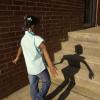
Exploring Shadows
Source Institutions
This activity guide features three related explorations to help learners ages 3-6 investigate shadows via the following science concepts: A shadow is made when an object blocks the light; you can chan

Capturing Homemade Microgravity
Source Institutions
This activity (page 2 of the PDF under SciGirls Activity: Microgravity) is a full inquiry investigation into how ordinary things behave in microgravity, similar to what astronauts experience.

My Angle on Cooling: Effects of Distance and Inclination
Source Institutions
In this activity, learners discover that one way to cool an object in the presence of a heat source is to increase the distance from it or change the angle at which it is faced.

Double Dutch Distractions
Source Institutions
This activity (page 2 of the PDF under SciGirls Activity: Double Dutch) is a full inquiry investigation into whether hearing or seeing has a bigger effect on jump rope performance.

Self-Portrait Silhouettes: Activity 2
Source Institutions
In this activity, learners make a photographic image—without a camera!

Pop! Rocket Launcher
Source Institutions
In this activity, learners construct a simple air pressure launcher for paper rockets.
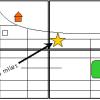
Solar System in My Neighborhood
Source Institutions
In this activity, learners shrink the scale of the vast solar system to the size of their neighborhood.

Science at the Waterpark!
Source Institutions
This activity (on page 2 of the PDF under SciGirls Activity: Water Slides) is a full inquiry investigation into speed and motion and takes place at a water park.

Rain Machine (Solar Still)
Source Institutions
In this activity, learners work in groups to build simple solar stills filled with salt water. After the stills are complete, learners observe what happens when they place the stills in the sun.
Making An Impact!
Source Institutions
In this activity (on page 14 of PDF), learners use a pan full of flour and some rocks to create a moonscape.
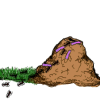
ANTacid: Indicator Paper on an Anthill
Source Institutions
In this activity, learners make acid/base indicator paper, place the indicator paper on an anthill, disturb a bunch of ants, and then observe what happens!

Canned Heat
Source Institutions
In this activity, learners explore how light and dark colored objects absorb the Sun's radiations at different rates.

Sensory Hi-Lo Hunt
Source Institutions
In this outdoor activity, learners use only their senses to to find the extremes of several environmental variables or physical factors: wind, temperature, light, slope and moisture.

The Thousand-Yard Model
Source Institutions
This is a classic exercise for visualizing the scale of the Solar System.
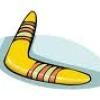
Boomerang
Source Institutions
Everybody loves boomerangs! In this activity about force and motion, the learners will experiment with boomerangs and explore how they work. This is a great activity to get learners up and moving.

Roller Coaster Design
Source Institutions
This activity (on page 3 of the PDF under GPS: Roller Coaster Design Activity) is a full inquiry investigation into g-force and acceleration.
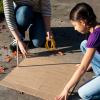
Ancient Sun Observations
Source Institutions
In this activity, learners make their own Sun tracker to explore how ancient civilizations around the world studied the Sun.
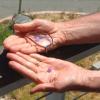
Exploring Ultraviolet (UV) light from the Sun
Source Institutions
In this outdoor activity, learners explore UV rays from the Sun and ways to protect against these potentially harmful rays.
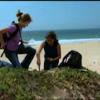
Sand Dunes
Source Institutions
This outdoor activity (on page 2 of the PDF under SciGirls Activity: Sand Dunes) is a full inquiry investigation into how the amount of moisture in a sand dune relates to the number of plants growing
